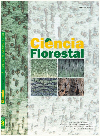
|
Ciência Florestal
Centro de Pesquisas Florestais - CEPEF, Departamento de Ciências Florestais - DCFL, Programa de Pós Graduação em Engenharia Florestal - PPGEF
ISSN: 0103-9954
EISSN: 0103-9954
Vol. 28, No. 2, 2018, pp. 542-553
|
 Bioline Code: cf18050
Bioline Code: cf18050
Full paper language: Portuguese
Document type: Research Article
Document available free of charge
|
|
|
Ciência Florestal, Vol. 28, No. 2, 2018, pp. 542-553
| pt |
SOLOS FLORESTAIS EM FRAGMENTO DE FLORESTA URBANA NA MATA DE DOIS IRMÃOS, RECIFE, PERNAMBUCO, BRASIL
Lima, Maria Salomé de; Freire, Fernando José; Marangon, Luiz Carlos; Almeida, Brivaldo Gomes de; Ribeiro, Eberson Pessoa & Santos, Renato Lemos dos
Resumo
O remanescente florestal que compõe o Parque Estadual Dois Irmãos (PEDI) é considerado como um dos
maiores fragmentos florestais urbanos do Brasil. Há relatos no Parque da ocorrência de frequentes quedas de
árvores sadias em condições naturais na reserva, o que pode comprometer seu equilíbrio natural e sua função
como fragmento florestal urbano. É provável que este fenômeno possa estar associado com características
químicas e físicas dos solos que compõem o PEDI. A presente pesquisa teve como objetivo avaliar química e
fisicamente os solos do PEDI, identificando, mapeando e analisando o solo nas áreas de ocorrência de queda
das árvores no locus da pesquisa. Foram mapeados 12 pontos de coleta de amostras em área representativa
do PEDI. Amostras deformadas foram coletadas nas profundidades 0-0,10 m; 0,10-0,30 m; e 0,30-0,60 m
e amostras não deformadas foram coletadas nas profundidades 0-0,05 m e 0,10-0,15 m. Nas amostras
deformadas determinaram-se todos os atributos químicos e parte dos atributos físicos. Em amostras não
deformadas determinaram-se apenas atributos físicos. Os solos do PEDI apresentaram baixa fertilidade natural.
Mostraram reação ácida e com elevadas concentrações de Al3+ até 0,60 m de profundidade, que podem formar
barreiras químicas que prejudicam o crescimento das raízes das plantas e podem estar causando a frequente
queda de árvores no Parque. Os solos foram, em sua maioria, classificados como de textura argilosa a muito
argilosa, muito permeáveis ao movimento vertical e lateral de água. Apresentaram uma elevada variabilidade
na condutividade hidráulica e redução abrupta de umidade volumétrica com aplicação de pequenas tensões em
camadas superficiais, além de maior retenção de água pelo Latossolo em subsuperfície. Com a finalidade de
ampliar as informações e criar um banco de dados para estudos futuros, sugere–se o monitoramento das
espécies mais vulneráveis à queda, além de analisar outros elementos químicos e físicos do solo do PEDI,
como a abertura de perfis para compreender a dinâmica das raízes pivotantes.
Palavras-chave
queda de árvores; atributos químicos e físicos do solo; acidez de solos florestais
|
| |
| en |
FOREST SOILS IN AN URBAN FOREST REMNANT IN MATA DE DOIS IRMÃOS, RECIFE, PERNAMBUCO STATE, BRAZIL
Lima, Maria Salomé de; Freire, Fernando José; Marangon, Luiz Carlos; Almeida, Brivaldo Gomes de; Ribeiro, Eberson Pessoa & Santos, Renato Lemos dos
Abstract
The forest remnant that composes ‘Parque Estadual Dois Irmãos’ (PEDI) is regarded as one of the largest urban
forest fragments in Brazil. There are reports of frequent occurrence of healthy fall trees in the park, in natural
conditions, which may compromise its natural balance and its function as an urban forest fragment. Probably,
this phenomenon is associated to the chemical and physical properties of the soils comprising PEDI. So, this
research aimed to evaluate PEDI soils chemical and physically, identifying, mapping and analyzing the soils
in the occurrence of falling tree areas at the research locus. Twelve points of sampling in a representative
area of PEDI were mapped, where deformed samples were collected at depths 0-0.10; 0.10-0.30 and
0.30-0.60 m, and not deformed samples at depths 0-0.05 and 0.10-0.15 m. The chemical attributes and part of
the physical attributes were determined in the deformed samples. And other physical attributes were determined
in the undisturbed samples. The soils of PEDI were low in natural fertility. They have acid reaction and high
concentrations of Al3+ to 0.60 m, and this can create chemical barriers that damage the growth of the plant roots
and may be the cause of the frequent tree falling in the park. The soils were classified as clayed to very clayed,
very permeable to vertical and lateral water movement. They had high variability in hydraulic conductivity
and sharp decrease of water volumetric content in applying small stresses in surface layers as well as higher
water retention by soil in Oxisol subsurface. In order to extend the information and create a database for
future studies, it is suggested the monitoring of the most vulnerable species to fall, and analyzing other
chemical and physical properties of PEDI soils, also opening profiles to understand tap root dynamics.
Keywords
falling trees; chemical and physical soil attributes; forest soil acidity
|
| |
© Copyright [2018] - Ciência Florestal
Alternative site location: http://cascavel.ufsm.br/revistas/ojs-2.2.2/index.php/cienciaflorestal/index
|
|
